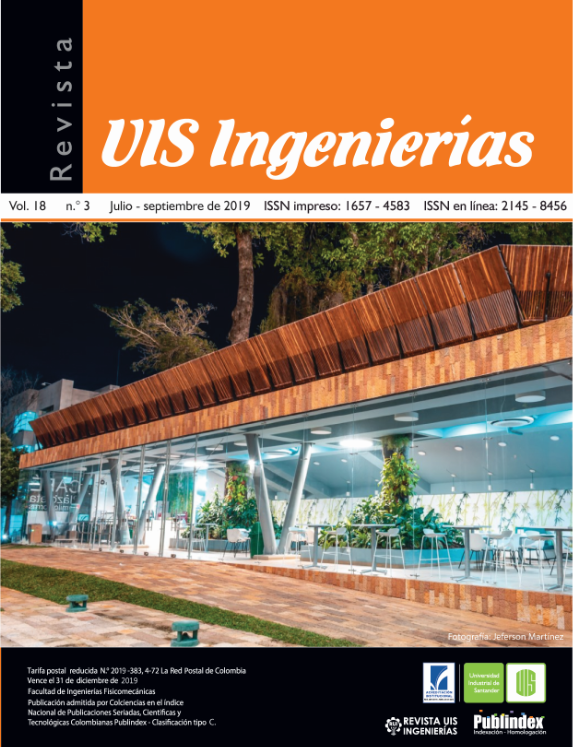Parameter estimation of induction motors from power losses measurements
Published 2019-05-20
Keywords
- efficiency,
- power losses,
- induction motor,
- optimization
How to Cite
Abstract
The new labeling rule in Colombia RETIQ Art. 12 three-phase induction motors type squirrel cage for 60 Hz requires induction motors to specify their efficiency under nominal conditions. The International Electrotechnical Commission (IEC) indicates three ways to compute induction motor efficiency. One of these ways considers in detail each of the power losses in the motor. It is clear that from the standpoint of manufacturers it would be advantageous to know the power losses detailed to improve motor efficiency. Furthermore, the measurements made to compute power losses provide enough information to estimate the electrical parameters of induction motors, using optimization algorithms. This work explores parameter estimation of induction motors using the measurements indicated by the IEC to estimate power losses in induction motors. In particular, the algorithms of global optimization, harmony and hybrid genetic algorithms, produce consistent estimates of the electrical parameters of the induction motor. Once the electrical parameters of the induction motor are found, its performance can be modeled for any load condition, including transient states.
Downloads
References
- IEC Rotating electrical machines. Part 2-1: Standard methods for determining losses and efficiency from tests, IEC 60034-2-1, 2007.
- R. K. Ursem y P. Vadstrup, “Parameter identification of induction motors using stochastic optimization algorithms,” Applied Soft Computing, vol. 4, no. 1, pp. 49–64, Feb. 2004.
- M. S. Aspalli, S. B. Shetagar y S. F. Kodad, “Estimation of induction motor field efficiency for energy audit and management using genetic algorithm,” Proc. IEEE 3rd International Conference on Sensing Technology, Tainan, Taiwan, 2008, pp. 440-445.
- H. Babei y H. Zayandehroodi, “Estimation of induction motor efficiency value by nature based optimization algorithm,” Int. J. Rev. Life. Sci., vol. 5, no. 8, pp. 473-481, Nov. 2015.
- A. Charette et al., “The use of the genetic algorithm for in-situ efficiency measurement of an induction motor,” Proc. IEEE Power Engineering Society Winter Meeting, Singapur, Singapur, 2000, pp. 392-397.
- I. Kostov, V. Spasov y V. Rangelova, “Application of genetic algorithms for determining the parameters of induction motors,” Technical Gazette, vol. 16, no. 2, pp. 49-53, Jun. 2009.
- H. R. Mohammadi y A. Akhavan, “Parameter Estimation of Three-Phase Induction Motor Using Hybrid of Genetic Algorithm and Particle Swarm Optimization,” Hindawi Publishing Corporation Journal of Engineering, vol. 2014, pp. 1-6, Dic. 2014.
- T. Phumiphak, T. y C. Chat-uthai, “Estimation of induction motor parameters based on field test coupled with genetic algorithm,” Proc. of the IEEE International Conference on Power System Technology, Kunming, China, 2002, vol. 2, pp. 1199-1203.
- V. Spasov et al., “An efficient approach for determining induction motors parameters,” Acta Tehnica Corviniensis - Bulletin of Engineering, vol. 7, no. 2, pp. 117-122, Abr.-Jun., 2014.
- Y. Tai et al., “Efficiency optimization of induction motors using genetic algorithm and hybrid genetic algorithm,” Proc. of the IEEE International Conference on Electrical Machines and Systems, Beijing, China, 2011, pp. 1-4.
- J. R. Marques, I. F., Machado y J. R. Cardoso, “Induction Motor parameter determination using the Harmony Search Algorithm to power, torque and speed Estimation,” 38th Annual Conference on IEEE Industrial Electronics Society, Montreal, Canada, 2012, pp. 1835-1840.
- D. Bae et al., “Determination of induction motor parameters by using neural network based on FEM results,” IEEE Transactions on Magnetics, vol. 33, no. 2, pp. 1924-1927, Mar. 1997.
- R. K. Ursem y P. Vadstrup, “Parameter identification of induction motors using differential evolution,” Congreso Evolutionary Computation (CEC), Canberra, Australia, 2003, vol. 2, pp. 790-796.
- V. P. Sakthivel, R. Bhuvaneswari y S. Subramanian, “An accurate and economical approach for induction motor field efficiency estimation using bacterial foraging algorithm,” Journal of the International Measurement Confederation, vol. 44, no. 4, pp. 674–684, May. 2011.
- V. P. Sakthivel, R. Bhuvaneswari y S. Subramanian, “Artificial immune system for parameter estimation of induction motor,” Expert Systems with Applications, vol. 37, no. 8, pp. 6109–6115, Ago. 2010.

